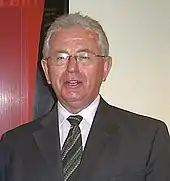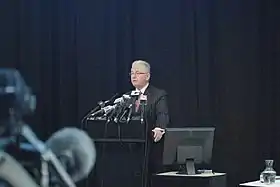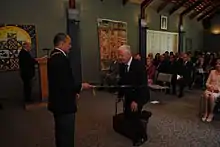Michael Cullen (politician)
Sir Michael John Cullen KNZM (born 5 February 1945) is a former New Zealand politician. He served as Deputy Prime Minister of New Zealand, also Minister of Finance, Minister of Tertiary Education, and Attorney-General. He was the Deputy Leader of the Labour Party from 1996 until November 2008, when he resigned following a defeat in the general election. He resigned from Parliament in April 2009, to become the deputy chairman of New Zealand Post from 1 November 2009[1] and chairman from 1 November 2010. On 6 March 2020 he announced that he had resigned from the Lakes and Bay of Plenty district health boards, respectively. At the same time he also announced that he had been diagnosed with stage 4 small-cell lung cancer, which had also spread to his liver.[2]
Sir Michael Cullen | |
|---|---|
 Official portrait of Cullen, 2008 | |
| 40th Minister of Finance | |
| In office 10 December 1999 – 19 November 2008 | |
| Prime Minister | Helen Clark |
| Preceded by | Bill Birch |
| Succeeded by | Bill English |
| 16th Deputy Prime Minister of New Zealand | |
| In office 15 August 2002 – 19 November 2008 | |
| Prime Minister | Helen Clark |
| Preceded by | Jim Anderton |
| Succeeded by | Bill English |
| 30th Attorney-General of New Zealand | |
| In office 28 February 2005 – 19 October 2005 | |
| Prime Minister | Helen Clark |
| Preceded by | Margaret Wilson |
| Succeeded by | David Parker |
| In office 21 March 2006 – 19 November 2008 | |
| Prime Minister | Helen Clark |
| Preceded by | David Parker |
| Succeeded by | Chris Finlayson |
| 4th Treasurer of New Zealand | |
| In office 10 December 1999 – 15 August 2002 | |
| Prime Minister | Helen Clark |
| Preceded by | Bill English |
| Succeeded by | Position Abolished |
| Member of the New Zealand Parliament for St Kilda | |
| In office 28 November 1981 – 12 October 1996 | |
| Preceded by | Bill Fraser |
| Succeeded by | Seat Abolished |
| Member of the New Zealand Parliament for Dunedin South | |
| In office 12 October 1996 – 27 November 1999 | |
| Preceded by | Seat Established |
| Succeeded by | David Benson-Pope |
| Member of the New Zealand Parliament for Labour Party List | |
| In office 27 November 1999 – 29 April 2009 | |
| Succeeded by | Damien O'Connor |
| Chair of New Zealand Post | |
| In office 1 November 2010 – 1 November 2016 | |
| Prime Minister | John Key |
| Preceded by | Jim Bolger |
| Succeeded by | Jane Taylor |
| Personal details | |
| Born | 5 February 1945 London, England |
| Political party | Labour |
| Spouse(s) | 1. Rowena Joy Knight
(m. 1967; div. 1989) |
| Profession | Historian |
| Academic background | |
| Alma mater | University of Canterbury (MA) University of Edinburgh (PhD) |
| Thesis | Social statistics in Britain 1830–852 (1971) |
| Academic work | |
| Discipline | History |
| Institutions | University of Otago |
Early life and education
Cullen was born in Enfield in north London on 5 February 1945,[3] the son of Ivy May Cullen (née Taylor) and John Joseph Thomas Cullen.[4] His father was a spectacle frame maker and his mother was a secretary.[5] The family emigrated from Tottenham to New Zealand in 1955, where friends gave him the nick-name "Pom", and Cullen attended secondary school at Christ's College in Christchurch.[4] He went on to study history at the University of Canterbury, earning a Bachelor of Arts degree in 1965, and a Master of Arts in 1968.[4] Receiving a Commonwealth Scholarship he then gained a PhD in social and economic history from the University of Edinburgh.[6] He was the first person in his family to attend university.[5] From 1971 to 1981 he was a lecturer at the University of Otago, with a term as a visiting fellow at the Australian National University from 1975 to 1976.[7] One of his students was future MP Michael Laws, of whom he said "A very bright student, but you knew there was something not quite right, even then."[5]
Whilst Cullen was researching his thesis on poverty in the late 19th century in London he discovered that the street in which his maternal grandparents grew up was famed for semi-criminal activities. They proceeded to become working class respectables and then his father became a semi-skilled tradesman.[5]
Cullen became a naturalised New Zealand citizen in 1975.[3]
Member of Parliament
| New Zealand Parliament | ||||
| Years | Term | Electorate | List | Party |
| 1981–1984 | 40th | St Kilda | Labour | |
| 1984–1987 | 41st | St Kilda | Labour | |
| 1987–1990 | 42nd | St Kilda | Labour | |
| 1990–1993 | 43rd | St Kilda | Labour | |
| 1993–1996 | 44th | St Kilda | Labour | |
| 1996–1999 | 45th | Dunedin South | 2 | Labour |
| 1999–2002 | 46th | List | 2 | Labour |
| 2002–2005 | 47th | List | 2 | Labour |
| 2005–2008 | 48th | List | 2 | Labour |
| 2008–2009 | 49th | List | 2 | Labour |
Cullen joined the Labour Party in 1974, and served on the party's Executive and Council between 1976 and 1981. In 1981 he was elected MP for the Dunedin electorate of St Kilda.[8] In 1983 he was appointed as Labour's spokesperson for the environment.[9]
Fourth Labour Government
When Labour entered government in 1984, Cullen became Senior Whip. Due to his knowledge of economics, Cullen became increasingly involved in the disputes surrounding the Minister of Finance, Roger Douglas, who supported the liberalisation of trade and the sale of state assets plus deep tax cuts. These goals, which were against traditional Labour policies, angered both party members and the public. When the Prime Minister, David Lange, attempted to limit the influence Douglas had on the government's direction, Cullen became involved on Lange's side. After Labour's re-election in 1987, Cullen was made Associate Minister of Finance (an attempt by Lange to provide an anti-reform counterbalance to the radical Douglas) and Minister of Social Welfare.[10]
After Cullen had been elevated to Cabinet, his father died after a long and painful illness, his marriage ended and his dog died prompting him to ponder resigning; "I seriously considered quitting from Cabinet, but the least I could do was stay there for Helen [Clark] and David [Lange] and make sure we didn't lose social policy to the Rogernomes who were driving so much of the policy."[5] Eventually, Douglas was forced to resign, but a month later the political controversies around the dispute prompted the resignation of Lange himself. Douglas was succeeded as Finance Minister by David Caygill, one of his allies (albeit a considerably less radical one). Cullen was made Associate Minister of Health, in an attempt reduce the effect of reforms on that sector.[11]
In 1989 he married fellow Labour MP Anne Collins.[5]
Opposition
When Labour lost the 1990 election – attributed to public anger at Douglas' reforms, and disarray within the Labour Party – Cullen returned to being Labour's spokesperson on social welfare. The following year, he replaced David Caygill as the party's chief finance spokesperson.[12] Before Labour's position in the polls improved, Cullen was also involved in an attempt to oust Helen Clark as party leader, which was not successful. Soon after, when Caygill decided to retire from politics in 1996, Cullen took the deputy leader's post unopposed as well.[13] Cullen has claimed to be happy with his position as second, saying that in terms of personality, he is "a number two sort of person". Many commentators agree, believing that Cullen's strength lies more in administration than leadership.[5]
On 26 August 1999, Cullen was named by the Speaker Doug Kidd for saying that the National Member Max Bradford had lied, and that he was a "stooge" of the Employers Federation.[14]
Fifth Labour Government

Labour's electoral victory in 1999 resulted in Cullen becoming Minister of Finance. After the 2002 election, the electoral support for Labour's junior coalition partner (the Progressive Party) was not sufficient to justify its leader holding the Deputy Prime Minister position, resulting in Michael Cullen replacing Jim Anderton as Deputy Prime Minister.[15]
In 2005 Helen Clark appointed Cullen to the post of Attorney-General following the election of Margaret Wilson as Speaker of the House. His appointment became controversial because of his non-legal background (only one other non-lawyer had previously held the post) and because of his previous criticisms of the judiciary, including of the Chief Justice Dame Sian Elias.[16][17] His term in the position ended following the 2005 general election. However, with the resignation of David Parker in March 2006, Cullen took over the position again.[18]
He had a reputation as one of the Labour Party's best parliamentary debaters, and is known for his sometimes "acerbic" sense of humour.
Budget 2006
Cullen presented his seventh budget in 2006. Cullen's guiding principle was, he stated, "The fool who spends on the upturn will find himself broke on the downturn".[19]
Budget 2007
Labour's eighth budget in 2007 reduced company tax from 33% to 30%[20] and introduced a 15% research and development tax credit.[20] It also made a number of changes to the KiwiSaver scheme.[21]
Budget 2008

The New Zealand economy entered recession in December 2007.[22] Cullen's final budget was delivered in this context in May 2008; it reduced income tax on the first $9,500 earned from 15% to 12.5%,[23] and the company tax rate from 30% to 29%.[23]
Resignation
The day after the defeat of Labour in the 2008 general elections and Helen Clark's resignation as party leader, Cullen announced his resignation as deputy leader of the Labour Party.[24] When he resigned from Parliament in 2009 he was replaced as an MP from the party list by Damien O'Connor.
Political views
Cullen identifies as a social democrat.[25]
In 2004 Cullen declared his support for the monarchy of New Zealand, describing himself as "a sort of token monarchist in the Cabinet these days".[26] However, in 2010 he repudiated that stance, taking the view that New Zealand should move towards a republic once the Queen's reign ends.[27]
Cullen voted in favour of the third reading of the Civil Union Bill 2004, which legalised civil unions in New Zealand.[28]
Post politics
After leaving parliament, Cullen held a number of roles on the New Zealand civil service, including serving on the Tax Working Group[29] and chairing the Earthquake Commission.[30] He also joined the board of retirement insurance business Lifetime Income.
In March 2020, Cullen stood down from most of his public roles after announcing that he had been diagnosed with stage IV small-cell lung cancer.[31]
Honours and awards

In 1990, Cullen was awarded the New Zealand 1990 Commemoration Medal.[32] On 16 December 2009, Cullen received an honorary LLD from the University of Otago in recognition of "his contributions as an Otago academic and as a respected and highly influential politician".[33]
In the 2012 Queen's Birthday and Diamond Jubilee Honours, Cullen was appointed Knight Companion of the New Zealand Order of Merit.[34]
Notes
- "Cullen leaves politics for NZ Post role". The New Zealand Herald. 7 April 2009.
- "Sir Michael Cullen announces lung cancer diagnosis". Stuff. 6 March 2020. Retrieved 19 April 2020.
- "New Zealand naturalisations, 1843–1981". Ancestry.com Operations. 2010. Retrieved 7 March 2020.
- Lambert, Max, ed. (1991). Who's Who in New Zealand (12th ed.). Auckland: Reed. pp. 142–143. ISBN 0-7900-0130-6.
- Bowron, Jane (16 June 1996). "Generations of gain for Cullen family". Sunday Star Times. p. C2.
- J., Cullen, M. (1971). "Social statistics in Britain 1830 - 1852". hdl:1842/16371. Cite journal requires
|journal=(help) - "Hon Dr Michael Cullen". New Zealand Parliament. Archived from the original on 1 November 2007. Retrieved 5 December 2007.
- Franks & McAloon 2016, pp. 196.
- "Labour leader allocates responsibilities". The Press. 17 March 1983. p. 3.
- Franks & McAloon 2016, pp. 219.
- Bassett 2008, p. 411.
- "Labour line-up". The New Zealand Herald. 6 December 1991. p. 5.
- Kirk, Jeremy (12 June 1996). "Clark secure as rebels pledge fealty; Cullen picked as Caygill quits". The Press.
- Hansard. 579. New Zealand Parliament. 1999. p. 1077.
- "Executive team of 28 in parliamentary lineup". Waikato Times. 15 August 2002. p. 2.
- "Richard Worth: Cullen appointment degrades office of Attorney-General". The New Zealand Herald. 5 January 2005. ISSN 1170-0777. Retrieved 20 February 2018.
- Noted. "Court marshal - The Listener". Noted. Retrieved 20 February 2018.
- "Parker quits all Cabinet posts". The New Zealand Herald. 21 March 2006. Retrieved 22 June 2008.
- "Government announces $1.3b boost for transport". The New Zealand Herald. 18 May 2006. Retrieved 20 March 2015.
- "Budget 2007 tax announcements". IRD. 17 May 2007. Retrieved 24 March 2015.
- "KiwiSaver Savers Fact Sheet Q&A" (PDF). IRD. 17 May 2007. Retrieved 24 March 2015.
- "How bad is the Current Recession? Labour Market Downturns since the 1960s". Ministry of Business, Innovation and Employment. Archived from the original on 15 December 2014. Retrieved 15 December 2014.
- "Budget 2008 - Tax Changes". 22 May 2008. Archived from the original on 25 March 2015. Retrieved 24 March 2015.
- "Cullen resigns after election defeat". The New Zealand Herald. 9 November 2008. Retrieved 9 November 2008.
- Cullen, Michael (10 December 2012). "The Political Economy of Long Term Fiscal planning from a Social Democratic Perspective" (PDF). Affording Our Future Conference. Retrieved 20 May 2019.
- Daily Hansard: Clerk of the House of Representatives. Clerk of the House of Representatives. 16 December 2004.
- "Cullen: New Zealand should be republic". Herald on Sunday. The New Zealand Herald. 29 August 2010. Retrieved 29 August 2010.
- "Civil Unions Act". New Zealand Parliamentary Conscience Votes Database. 2004. Archived from the original on 20 January 2019. Retrieved 20 May 2019.
- https://www.stuff.co.nz/business/117827804/smokers-may-catch-a-break-as-nz-first-opposes-last-of-10-automatic-tax-hikes
- https://www.stuff.co.nz/business/117406840/earthquake-commission-says-sorry-for-canterbury-earthquake-claims-failures
- "Sir Michael Cullen resigns from roles due to stage-four lung cancer". RNZ News. 6 March 2020. Retrieved 7 March 2020.
- Taylor, Alister; Coddington, Deborah (1994). Honoured by the Queen – New Zealand. Auckland: New Zealand Who's Who Aotearoa. pp. 112–113. ISBN 0-908578-34-2.
- "Otago to confer honorary degrees on Michael Cullen, Trevor Scott". University of Otago. 9 December 2009. Retrieved 31 December 2009.
- "The Queen's Birthday and Diamond Jubilee Honours List 2012". New Zealand Honours Lists. Department of the Prime Minister and Cabinet. Archived from the original on 4 June 2012. Retrieved 30 June 2012.
References
- Bassett, Michael (2008). Working with David: Inside the Lange Cabinet. Auckland: Hodder Moa. ISBN 978-1-86971-094-1.
- Franks, Peter; McAloon, Jim (2016). Labour: The New Zealand Labour Party 1916-2016. Wellington: Victoria University Press. ISBN 978-1-77656-074-5.
External links
| Wikimedia Commons has media related to Michael Cullen. |
| New Zealand Parliament | ||
|---|---|---|
| Preceded by Bill Fraser |
Member of Parliament for St Kilda 1981–1996 |
Constituency abolished |
| New constituency | Member of Parliament for Dunedin South 1996–1999 |
Succeeded by David Benson-Pope |
| Political offices | ||
| Preceded by Jim Anderton |
Deputy Prime Minister of New Zealand 2002–2008 |
Succeeded by Bill English |
| Preceded by Bill Birch |
Minister of Finance 1999–2008 | |
| Preceded by Margaret Wilson |
Attorney-General 2005 2006–2008 |
Succeeded by David Parker |
| Preceded by David Parker |
Succeeded by Chris Finlayson | |
| Preceded by Ann Hercus |
Minister for Social Welfare 1987–1990 |
Succeeded by Jenny Shipley |
| Party political offices | ||
| Preceded by David Caygill |
Deputy Leader of the New Zealand Labour Party 1996–2008 |
Succeeded by Annette King |
| Preceded by Jonathan Hunt |
Senior Whip of the Labour Party 1984–1987 |
Succeeded by Margaret Austin |
| Honorary titles | ||
| Preceded by Helen Clark |
Father of the House 2009 |
Succeeded by Jim Anderton |